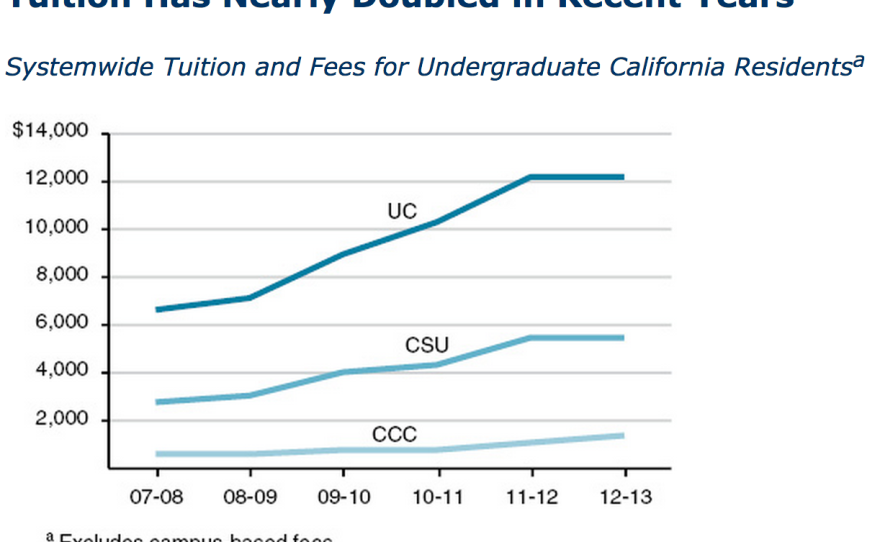Tuition at UC San Diego and other UC campuses across the state would increase by 5 percent a year over the next five years under a proposal approved Wednesday by a University of California Board of Regents committee.
The full board is expected to consider the proposal on Thursday. The voice vote by members of the Regents' Committee on Long Range Planning was virtually drowned out by protesters who were chanting inside the meeting room at UC San Francisco.
Several board members spoke against the tuition hike. Others said that while they don't want to raise students' costs, the UC has no choice due to a shortage of funding from the state. Regent Sherry Lansing said she was "saddened" at having to vote for a tuition hike, particularly following the 2012 passage of Proposition 30, an education sales tax.
"When this board unanimously supported Proposition 30, when the students unanimously came out along with the alumni and faculty, it was with the complete understanding that a huge percentage of this money for Prop 30 would fully fund the university so we can continue with our enrollment growth," she said. "Sadly, that has not happened."
Gov. Jerry Brown, who opposed the tuition hike and called for the creation of a state-UC committee to examine ways of reducing students' costs, told the board money from Prop 30 is coming in
"It may not be as much as you want, but it's real money," he said. "Without it we'd be in real trouble."
The proposal would raise annual tuition 5 percent over the next five years, making the tuition more than $15,000 by 2019.
UC officials maintain the hike is necessary to help recruit more in- state students, offset salaries, which are on average $116,000 for faculty, and higher pension costs.
Opponents of the plan contend the UC system dug itself into a hole by suspending member contributions into its pension fund and failing to enact reforms to the system's defined-benefit plans until unfunded liabilities had swelled — now totaling $7.2 billion.
This year, the UC system will pay an estimated $1.3 billion into the pension fund. UC Chief Financial Officer Nathan Brostrom told one newspaper that if the state would cover a third of that, tuition hikes wouldn't be on the table now.
UC President Janet Napolitano said tuition rates have been frozen for three years, and higher state funding could lessen the need for tuition increases.
"The investment per student by the state to the University of California is much lower than it has been in decades," she said.
According to the California Department of Finance, the UC system's general fund allocation was upped this year, and how to appropriate revenue is left to the board's discretion.
UC President Janet Napolitano noted that tuition rates have been frozen for three years. If the 5 percent increase is approved, it will bump tuition for the 2015-16 school year by $612, to $12,804. Out-of-state students would pay the same increased rate, plus the non-resident fee of $22,878, which would also increase by the same percentage, according to UC.

The 5 percent increase assumes the state will provide the university system with a promised 4 percent increase in funding. But UC officials say that increase still falls short and doesn't even cover the cost of inflation.
Napolitano has said she hopes the plan will offer some stability to students and gradual, predictable increases instead of possible large spikes in tuition — eliminating "volatility" in the tuition-setting process. She also hopes it will spur the state to boost its funding of UC.
Members of the committee said pressure needs to be placed on the Legislature to increase funding for the system. They noted that if the state provides funding beyond the anticipated 4 percent increase, the proposed tuition increase would be reduced or even eliminated.
"Give us the money we thought we were getting if we supported Prop 30," Regent Norman Pattiz said. "We need the help that the citizens of the state of California gave us all when they voted for Prop 30. We just need our fair share. Let us have it and this won't be an issue."
Assembly Speaker Toni Atkins, D-San Diego, said she opposes the tuition hike and plans to introduce a bill seeking to boost funding for the UC system by increasing state appropriations.

"The proposed fee increase of more than 25 percent is unacceptable. California students and their families have faced too many fee increases already," said Atkins, who is an ex-officio regent with voting rights. "Instead, UC should work with the Legislature and governor to get UC the money it needs to remain one of the state's world-class assets, without harming the California students and families the university was created to serve."
Atkins is seeking to allocate the UC system an additional $50 million from the general fund. Her proposal also calls for capping out-of-state enrollments at current-year levels in order to add 10,000 additional slots for in-state enrollees, as well as hiking tuition for out-of-state students by $5,000.






